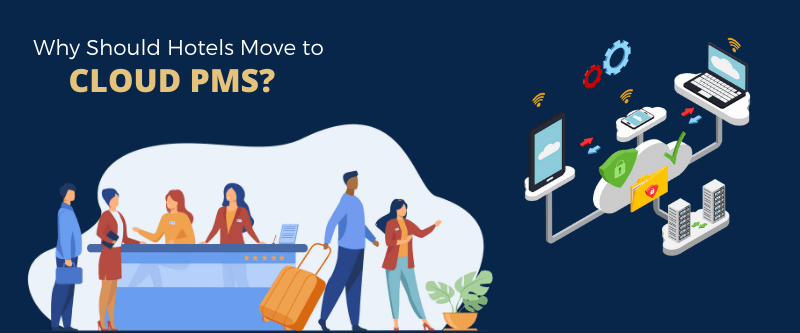Cloud technology has become a buzzword. So much so that enthusiasts with varying backgrounds are going vocal about it.
Even the experts say that “Cloud is the new normal”.
But it’s not something very new; cloud technology has been around for quite some time now. It is just that the COVID-19 pandemic has accelerated its popularity, making it one of the essential aspects of a business’ tech stack.
Is this technology important for hotels as well?
The answer is a YES!
And that’s exactly what I am going to discuss in this blog. I will try to touch upon all the essential points and also state some solid reasons to move to cloud hotel PMS.
Table of Content
- Hotel Management Before the Cloud Technology
- The drawback of desktop-based hotel PMS
- Reasons to Move Hotel PMS to the Cloud
- Saves you cost
- Lets you manage your hotel remotely
- Gets better with time
- Offers easy and smooth deployment
- Makes switching and migrating easy
- Let’s you integrate with third-party solutions
- Provides robust security
- Increases guest experience
- Enhances staff efficiency
- Manages multiple properties with ease
- FAQs
Hotel Management Before the Cloud Technology
I have stayed in hotels where technology was nothing less than alien-ish.
I remember when my family visited Gangtok in 2004, we were driving from one hotel to another, asking whether they have rooms available.
Finally, when we found one and booked our stay, the front desk staff recorded our names in a register. Yes, that’s how they were managing reservations (I don’t think we need to talk about other hotel operations).
Fast forward to a few years, those registers were replaced by computers and excel sheets.
However, some complexities still needed to be addressed. Managing every department of a hotel wasn’t easy for hoteliers. This is when an on-premise hotel software (or PMS) was introduced.
The desktop-based software was a great deal for hotels worldwide. It helped them organize, schedule, and perform day-to-day operations with ease.
But again, the hospitality industry is ever-evolving. It is not just the accommodation providers, but also the guests’ whose preferences were changing. And soon, even the legacy hotel management system felt abortive.
And this brings me to the next point.
The Drawback of Desktop-Based Hotel PMS
Legacy hotel management systems were facing a downfall. But do you know why?
Here are some of the major drawbacks of traditional hotel PMS.
- It requires a complex technological infrastructure. From hardware to local servers to different licenses for each user.
- If you want to manage multiple properties, you need to install the hotel software in each system, get licenses and also, update them (whenever required) individually.
- The risk of data loss is more when you have your hotel software installed on different systems.
- There’s a lack of flexibility in legacy PMS because one always has to be at the property to manage all the operations.
- Legacy hotel PMS is also comparatively expensive considering all the tech requirements.
- Not to mention, if you want to have a seamless experience in working with other departments, integration is what you need. However, integrating other tools and modules isn’t a cakewalk.
These drawbacks were/are more than enough for hoteliers to rethink their management strategy. Investing in a system that involves so many complexities and costs, is definitely not the right choice.
We have a dedicated blog on cloud vs on-premise hotel software. You can read it to understand better.
Reasons to Move Hotel PMS to the Cloud
The future of hotel technology is approaching new levels faster than anyone could have anticipated.
The cloud is definitely one technology from the list as it ensures scalability, availability, and security of the business. And hotels must understand this as quickly as possible.
So, here’s a list of all the reasons why you should choose a cloud PMS for your hotel and ditch the old-school, legacy management systems.
1. Saves you cost
It goes without saying, the advantages of cloud-based hotel software is immense. And one such benefit is that they are much cheaper than traditional ones.
And why not?
You don’t have to set up a whole tech stack, buy licenses that cost you a fortune, and pay for those maintenance services. A cloud-based solution removes these hurdles for you. All you need is a computer or smart device and a stable internet connection.
2. Lets you manage your hotel remotely
Like I mentioned in the drawback, traditional systems require you to be at the property.
Since cloud-based PMS requires just a basic Internet connection, you can manage your hotel from anywhere, anytime.
You will be able to perform countless tasks such as check-ins, check-outs, report generation, reservation, and inventory management without even stepping into your property.
Not to mention, you can access your critical data right from your hand-held device.
3. Gets better with time
I am sure you all are aware of software updates. The apps on your mobile phones get better with time because developers often release updates to enhance user experience.
It is the same with cloud hotel software. The solution providers are constantly updating their products to provide you with the best experience.
Meaning, you don’t have to invest your time and efforts on this and you get all the updates without paying anything extra.
For example: In 2017 in India, GST was introduced. While many businesses had to find a way to handle GST, hotels with cloud PMS didn’t have to fret. Their solution providers updated the system accordingly to become GST compliant.
4. Offers easy and smooth deployment
If you want to go for a legacy PMS, then it will easily take weeks. From setting up server rooms to cooling systems to dealing with tangles of wires, you’ll have a tiresome feat.
However, if you root on cloud hotel PMS, you can simply buy the system, get training, and you are good to go live. It is that simple.
5. Makes switching and migrating easy
Cloud-based systems are efficient when you are switching and migrating from one to another. However, many hoteliers have the notion that it is like moving a mountain.
What if I lose all my data? What about all the bookings? What about the reports? All these questions keep bugging hoteliers.
While the fact is, cloud-based systems make switching and data migration really easy. Everything from your old system to a new system can be transferred without any loss when you move to cloud Hotel PMS.
6. Let you integrate with third-party solutions
It is important for hotels to have a PMS that manages every department seamlessly. And integrated solutions ensure just that; it provides you with additional features on your existing system.
This is where cloud PMS comes into the picture. Most of these systems come with an open API which makes integration with third-party solutions convenient.
Here are some of the essential integrations:
- Channel Manager
- Booking Engine
- Contactless Hospitality Solution
- Payment Gateway
- Reputation Management
- Payroll and Accounting
- CRM
7. Provides robust security
In a traditional setup, a server can be physically destroyed — by human error or in case of disasters. Meaning, there’s a high risk of data loss. Or, someone can hack into the computer and get hold of all the data.
But, on the other hand, cloud infrastructures are secure. They are equipped with advanced levels of security and monitored continuously, reducing the chances of data loss or theft.
8. Improves guest experience
When you say guest experience, it’s not just about the good night’s sleep. Guest experience starts from the very moment s/he books with your hotel.
Guests expect things to be personalised. Be it calling by their name or placing a bottle of wine in their room or making every operation at your hotel quick and apt.
With a cloud PMS, you can achieve all of it and more. Every time a guest books with your hotel, you can collect his/her data and use it to provide exceptional services.
It is all about leveraging guest preferences and behavioural data the right way to deliver a great experience.
9. Enhances staff efficiency
Cloud hotel PMS reduces a lot of human efforts and enhances the efficiency of the staff as most of the tasks get automated. Meaning, hotel staffs can have more time in hand and use that to improve the guest experience.
For example: When you have a cloud PMS and channel manager integrated, you can update your room inventory and rates in real-time on all channels.
Here’s one more example. A cloud PMS along with a contactless solution eliminates the need for guests to go to the frontdesk. Guests can self check-in and check-out with little to no human involvement.
10. Manages multiple properties with ease
Managing a hotel is already a tedious job. Then imagine how tough it would be for a chain of hotels. You have to juggle between room inventories, rates, reservations, and departments.
Further, the complexities could increase if you use individual management systems for each property.
But when you turn to cloud-based hotel software, you do away with all such challenges. You don’t even have to worry if your properties are at different locations. You can still manage all of them from one single platform. Be it staff monitoring, inventory management, rate management, handling POS outlets, or dealing with guest queries: a cloud solution can do it all.

FAQs
To move to a cloud-based hotel solution, you must first select the right technology vendor. These solution providers have a systemic process to help move from your legacy system to a cloud system. They will handhold you through every step of the migration and make sure you don’t lose out on any data.
Right away! Because there’s no point investing in traditional systems that pose more complexities than benefits. Cloud is the present and the future. And the benefits of cloud-based hotel solutions are just top-notch. Hotels that are migrating to it are going to be benefitted.
Your data gets stored in server farms or servers owned by other companies that are highly safe and secure. These servers are highly secured and follow all the necessary protocols for the safety of your data.
Investing in property management software is important; but, choosing the RIGHT one is challenging. That is why we have done a dedicated blog on this. You can read it here.
Conclusion
The hotel industry is moving fast towards being more technologically equipped. And it is not just the competition in the industry but also the evolving preferences of travellers.
Today, most travellers start and end their customer journey online. Meaning, hotels need to do everything to match the demands of these travellers.
Further, gone are those days when the frontdesk was about seating behind a desk and addressing customer queries. Today, it is more about delivering guest experience and letting technology take care of the day to day tasks.
You need to get to the future first, ahead of your customers, and be ready to greet them before they arrive.
Marc Benioff, founder & CEO, Salesforce.
Alas, you must move to cloud Hotel PMS if you want to stay competitive, profitable and guest-centric in this industry.



